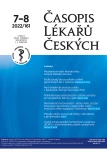-
Medical journals
- Career
Ethical principles for the usage and sharing of genomic data from research
Authors: Věra Franková 1,2; Hana Svozilová 3,4,5; Viktor Stránecký 2; Kateřina Staňo Kozubík 3,5; Josef Srovnal 6,7; Lucie Benešová 8; Magdalena Uvírová 9; Milan Macek 10; Šárka Pospíšilová 3,4,5
Authors‘ workplace: Ústav humanitních studií v lékařství 1. LF UK v Praze 1; Klinika pediatrie a dědičných metabolických poruch 1. LF UK a VFN v Praze 2; Centrum molekulární medicíny, Středoevropský technologický institut (CEITEC) MU v Brně 3; Ústav lékařské genetiky a genomiky LF MU a FN Brno 4; Centrum molekulární biologie a genetiky, Interní hematologická a onkologická klinika LF MU a FN Brno 5; Ústav lékařské genetiky LF UP a FN Olomouc 6; Ústav molekulární a translační medicíny LF UP v Olomouci 7; Genomac výzkumný ústav, s. r. o. 8; EUC Laboratoře CGB, a. s. 9; Ústav biologie a lékařské genetiky 2. LF UK a FN Motol 10
Published in: Čas. Lék. čes. 2022; 161: 271-275
Category: Guidelines
Overview
The current significant development of human genome/exome sequencing in biomedical research is one of the important paths leading to personalized medicine. However, sequencing of human genetic information generates potentially sensitive and exploitable data, which leads to ethical, legal, and security issues. For this reason, it is necessary to follow several measures when working with these data, applying to their entire life cycle – i.e., acquisition, storage, processing, usage, sharing, archiving, and reuse. In addition, importance of good practice during the whole data life cycle is emphasized by current European trends towards open science and digital transformation.
Therefore, the following recommendations have been developed, establishing principles for work with the whole human genome sequences or parts of it in research context. The recommendations are based on two documents published by the Global Alliance for Genomics and Health (GA4GH) and on foreign literature, thus summarizing recent relevant guidance on most aspects of working with human genomic data.
Keywords:
Genomics – ethics – guidelines – standards – data sharing
Sources
- Zákon č. 373/2011 Sb., o specifických zdravotních službách. Dostupné na: www.zakonyprolidi.cz/cs/2011-373
- Global Alliance for Genomic and Health. Framework for Responsible Sharing of Genomic and Health-Related Data. GA4GH, 2019. Dostupné na: www.ga4gh.org/genomic-data-toolkit/regulatory-ethics-toolkit/framework-for-responsible-sharing-of-genomic-and-health-related-data
- Global Alliance for Genomics and Health. Data Privacy and Security Policy. GA4GH, 2019. Dostupné na: www.ga4gh.org/wp-content/uploads/GA4GH-Data-Privacy-and-Security-Policy_FINAL-August-2019_wPolicyVersionsUPDATED.docx-2.pdf
- Thorogood A, Dalpé G, Knoppers BM. Return of individual genomic research results: are laws and policies keeping step? Eur J Hum Genet. 2019; 27 : 535–546.
- Finnegan T, Hall A. Identification and genomic data. PHG Foundation, Cambridge, 2017. Dostupné na: www.phgfoundation.org/report/identification-and-genomic-data
- National Human Genome Research Institute. Privacy in Genomics. Dostupné na: www.genome.gov/about-genomics/policy-issues/Privacy
- Tavaglione N, Martin, AK, Mazger N et al. Fleshing Out Vulnerability. Bioethics 2017; 29(2): 98-107.
Labels
Addictology Allergology and clinical immunology Angiology Audiology Clinical biochemistry Dermatology & STDs Paediatric gastroenterology Paediatric surgery Paediatric cardiology Paediatric neurology Paediatric ENT Paediatric psychiatry Paediatric rheumatology Diabetology Pharmacy Vascular surgery Pain management Dental Hygienist
Article was published inJournal of Czech Physicians

-
All articles in this issue
- ÚVODEM
- The International Code of Medical Ethics of the World Medical Association
- In 2022, a new version of the Code of Ethics was adopted by the World Medical Association (WMA) – what new features does it bring?
- Ethical principles for the usage and sharing of genomic data from research
- Indications for Metabolic and Bariatric Surgery – ASMBS/IFSO 2022
- Innovative Bariatric Procedures and Ethics in Bariatric Surgery: the IFSO Position Statement
- Practical recommendations for the management of children after kidney and liver transplantation
- Permanent urethral catheter – a good servant, but bad master: Guidelines for prevention, diagnosis, and treatment of catheter-associated urinary tract infections
- Prescription rules of hormone replacement therapy and its alternative
- Low levels of vitamin D in population exposed to significant environmental pollution
- The use of extracorporeal membrane oxygenation in the treatment of critical course of pneumonia
- COVID-19 infection elicits textbook immune response
- Trends in spa and balneology in postcovid era, outcomes, and perspectives
- The Fellowship of Czech Physicians in Prague and its activities in recent decades
- 160 years of Czech medicine through the prism of 16 jubilees of the Fellowship of Czech Physicians on the pages of the Journal of Czech Physicians
- Zemřel profesor Miroslav Ryska
- Journal of Czech Physicians
- Journal archive
- Current issue
- Online only
- About the journal
Most read in this issue- Permanent urethral catheter – a good servant, but bad master: Guidelines for prevention, diagnosis, and treatment of catheter-associated urinary tract infections
- COVID-19 infection elicits textbook immune response
- Prescription rules of hormone replacement therapy and its alternative
- The use of extracorporeal membrane oxygenation in the treatment of critical course of pneumonia
Login#ADS_BOTTOM_SCRIPTS#Forgotten passwordEnter the email address that you registered with. We will send you instructions on how to set a new password.
- Career

